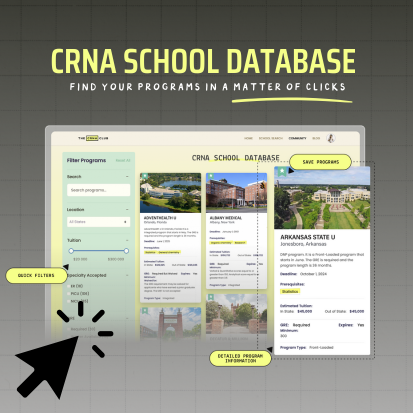TL;DR: YES!
You can become a CRNA in the United States with a foreign nursing degree.
And now that you know that, you’re probably wondering: How do I actually start?
Well, let’s dive into the full story 👇
Whether You’re Still Abroad or Already in the U.S.
If you hold a Bachelor of Science in Nursing (BSN) from your home country, you’re already on the right track. That degree can make you eligible for a green card through the EB-3 visa — a common pathway for thousands of international nurses coming to the U.S.
Here’s your first step:
Visit www.CGFNS.org and begin the process of validating your credentials. Then, apply for RN licensure in a U.S. state that doesn’t require a Social Security number to issue your license. Once you’re licensed as a registered nurse in the U.S., you’ll be eligible to apply for jobs that may sponsor your visa.
Getting to the U.S. is just the beginning, and yes, it’s often the longest and most complex part of the journey. But once you’re here and practicing as an RN, the path to CRNA becomes much clearer.
Step 1: Gain ICU Experience in Your Home Country
After graduating from nursing school, aim to start your career in a high-acuity environment, preferably in an ICU. Even if this early experience doesn’t officially count toward your U.S. CRNA application, it still gives you a major advantage. Why? Because hospitals and agencies that can sponsor your immigration journey to the U.S. are far more likely to place you directly into an ICU role if you already have critical care experience abroad.
And that matters, a lot! Once you arrive in the U.S., your top priority is to secure an ICU position as quickly as possible. The sooner you’re in that setting, the sooner you’ll meet the experience requirements to apply for CRNA school.
Step 2: Understand U.S. CRNA Requirements
Once you’re in the U.S., it’s time to get strategic. CRNA schools have high standards, but with the right ICU experience, you can absolutely meet them.
💡 Here’s what most programs require:
- 1–2 years of full-time ICU experience in the U.S.
(Yes, it has to be U.S.-based—most programs don’t accept international ICU experience.) - Hands-on care of critically ill, high-acuity patients.
Think: managing ventilators, titrating vasoactive infusions, interpreting arterial blood gases, and working with invasive lines like arterial lines, central lines.
Step 3: Evaluate Your Nursing Degree
While you’re gaining ICU experience, start the process of evaluating your international nursing degree through WES (World Education Services), which is the most commonly used agency. This will help translate your academic record into a U.S.equivalent GPA and determine whether you’ve completed key prerequisite courses like:
– General Chemistry
– Statistics
– Anatomy & Physiology
– Microbiology (depending on the program)
Now, here’s the truth: This step can feel a little discouraging, especially if you come from a country where universities use a pass/fail system (like I did in Sweden), or if you don’t have all the prerequisite coursework you need. When WES converted my grades, I ended up with a 3.0 GPA, which isn’t considered competitive by most CRNA standards. On top of that, my statistics course was integrated into other classes and didn’t even have “statistics” in the title, so I fell short on that as well.
But here’s the thing:
👉 I still got in.
In my case, I had a track record that helped balance out my GPA:
– I was president of 250+ nursing students at Karolinska Institute
– Vice President of the National Student Nurse Association in Sweden
– Board member of the European Nursing Student Association
– Completed two master’s degrees in Sweden, one of them as a Nurse Anesthetist, a role more similar to a CAA in the U.S.
Even with all of that, it was still difficult to find a program willing to accept me. But you know what? I got in. And so can you. Most CRNA programs evaluate candidates holistically. They care about your clinical experience, your personal statement, your determination, and your potential to grow into a safe, skilled anesthesia provider.
Step 4: English proficiency examination TOEFL/IELTS
Depending on the country you trained in, the language your degree was taught in, and how long you’ve lived in the U.S., you may need to take an English proficiency exam such as:
– TOEFL (Test of English as a Foreign Language)
– IELTS (International English Language Testing System)
Each exam also comes with its own set of benchmarks. The IELTS has an overall IELTS band score of 6.5, with no section below 6.0, and at least a 7.0 in the speaking section is required. For the TOEFL iBT, you are typically expected to score at least 81 overall, with a minimum of 24 in the Speaking section.
Some CRNA programs will waive this requirement if you’ve lived in the U.S. for several years or completed certain college-level coursework here. That’s why it’s essential to check each program’s specific requirements carefully. For context: I had been in the U.S. for only 1.5 to 2 years when I applied, so I needed to take an English proficiency test. And yes, it felt like one more hurdle, however it had to be done to achieve my goal of being admitted into a CRNA program!
Step 5: Own Your Journey
By now, you’ve probably realized that becoming a CRNA in the U.S. with a foreign nursing degree isn’t easy, but it’s absolutely possible. You’ll take additional steps like transcript evaluation, English proficiency tests, and building ICU experience in a new system. But once you’re here, the playing field levels out.
You’ll be held to the same high standards as everyone else applying to CRNA school, and you’ll rise to meet them! One of the biggest emotional hurdles I faced was the sense of starting over. After five years of working as a nurse abroad in different countries, I arrived in the U.S. feeling like I was behind. Like I was late to the race.
But here’s the truth:
You are not behind.
You are driven.
You are adaptable.
You are needed.
You are not “less than” because your path didn’t start in the U.S.
Your story matters. Your background is a strength—not a weakness.



